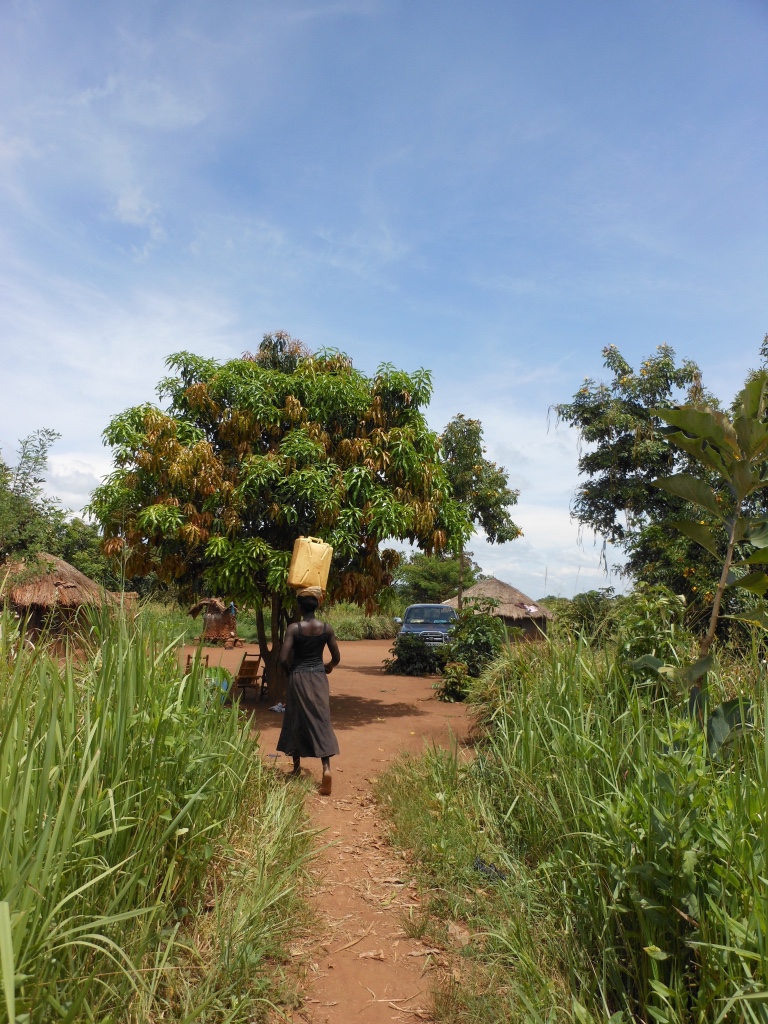For whatever it may offer, here’s a copy of the piece I The Humanitarian Press chose to publish.
“Although I have written other books and articles in my role as a business owner and personal productivity coach, this piece is written from my current perspective as a Peace Corps Volunteer serving in Northern Uganda in east Africa. One of my reasons for closing down a business and walking away from “normal life” and joining Peace Corps was to re-calibrate. For the past fifteen years, I have built and run a business (Focus On Space) that offered a toolbox of skills including everything from dispute resolution, Feng Shui, and organization to victim support and peak performance. It was successful; I enjoyed my work and my clients immensely and during that time wrote an award winning book, Moving Your Aging Parents, published by the Loving Healing Press. The point is that the decision to abandon it all and join Peace Corps was not related to feeling that I was not contributing. All of that was and continues to be useful, but something else called.
I wanted to create an opportunity to apply these skills in a more organic way at a more fundamental level—not tied to producing income, marketing and making an essentially spiritual process marketable. I also wanted to attempt to contribute on a more global scale. At some level, I was experiencing “burn out” and the way I decided to deal with it was to make a shift that was so drastic I would have to rely not on my “first world” automatic responses, but to immerse myself in a radically different paradigm where “autopilot” is not an option. I wanted an environment which would require me to dig deep—using not only the tools I’d developed over a lifetime, but to respond from my heart and my gut. Peace Corps provided such an opportunity.
So here I am in a country that is just emerging from 25 years of brutal, armed conflict. In addition, Uganda is one of the poorest countries in the world. And Northern Uganda is among the poorest of the poor. Environments recovering from war are called “post conflict” and the issues faced are distinctly different from those encountered in non-conflict areas, even those defined by their poverty. All of the infra-structures, social under-pinning and cohesiveness that come from living as a tribe were destroyed in the war as thousands of people were taken from the lands and confined in camps for Internally Displaced People (IDP for short). Their tribal elders were often killed; they could not bring their sacred ceremonial pieces with them; their children were raped or abducted to serve as child-soldiers (often having to kill their own family members); and they were not permitted to tend their crops because of the danger involved. This is the tip of the iceberg and I hesitate to be more graphic, because what was done in the name of war is too hideous to even imagine. Much of today’s living population was born in the IDP camps so they have none of the advantages of having known about their cultural heritages prior to the conflict. They are starting life again from the ground up, learning for the first time the ways of parenting, education, farming, self-sufficiency, and trust.

I tell you this as background, because it is in such striking contrast to what I thought I would find upon my arrival in this dirty little town with its mud streets, mosquitoes, mud huts with thatch roofs and litter. Everywhere – litter. Intermingled with this are the incongruous signs of the computer age and high tech, expensive NGO and ex-pat housing. I expected some underlying hostility, despair, dis-trust and remnants of Post Traumatic Stress. Certainly those are here in some measure that is not to be underestimated. The poverty is truly overwhelming; but the spirit of the people is indomitable, rich, and up-lifting. In spite of the vast number of international non-profit and religious organizations that have come to Northern Uganda to help people recover, the fact is, that the type of trauma suffered here is not something that first-world countries can even begin to address. And yet, what I found are people so gentle and generous in their approach to life, that I am awed on a daily basis by their resilience and their willingness to help another. Yes there is crime, abuse, and there are cultural mores that take one’s breath away. There is indifference to things we consider appalling, but those things don’t make the short list when compared to the real-life horrors they have suffered. All of us (PCVs) here serve independently, live in the same manner as the population we serve (limited or no access to water, electricity, and many other things we consider basic), and all of us continue to be humbled by the generosity of spirit we find in young and old.

What I am reminded of almost breath-by-breath is the role choice plays in every endeavor. In the aftermath of atrocities and in the present environment riddled by malaria, AIDS, and other diseases unknown in our squeaky clean first world lives, people move forward, plant their crops, bury their dead, nurse their children, and create inventive businesses on every corner to sustain life. They have made a choice to embrace life and the relatively new freedom they have beyond the confines of the squalid existence they lived in the camps. They dance, they sing, and they greet each other in long, melodic dialogues that leave the westerner wondering “when is this over.” One must slow down to breathe it in. It is not the experience I expected from Peace Corps – even though I didn’t have much of a pre-conceived notion of what I would find. We are assigned to a country and a post—there is little or no choice involved, other than to decline the invitation. And it IS an invitation—they are quite picky about who they choose. You have to be educated (four year degree), without debt and stunningly healthy. You can’t be “running from your problems.” One needs coping skills, a sense of humor, and flexibility above all else.
The problems here put those I experienced at home in perspective. But in no way am I implying that our own western problems are not significant. With every level of “advancement, civilization, or development” comes a level of complexity with its own demands and issues. Life in the US is complicated, I tell people. When they assume that if they could just move to the US, marry a Muzungu (foreigner), their woes would be magically erased, I explain that there are many problems in the developed world. Even at home, I recognized in large degree that “happiness is a choice.” Here it is made abundantly clear.
This environment has brought the matter of choice into high-definition in ways I could not have anticipated. Each day is an act of gratitude. I remember that each day I have the option to make a choice about how I will face the day—what attitude will I bring with me to my encounters. Sometimes, I wonder, “How is it that after all they have suffered, they can still make the choice to be positive.” But now, I believe that it is because of their past that they can make this choice. It is the contrast between the two that promotes clarity. They’ve experienced what most of us would describe as hell, looked the devil in the eye, and have lived to see another day. And for that they are grateful.
Do we choose love or hate, envy or gratitude, compassion or judgement, joy or anger, oneness or separateness? Because the longer I stay here – and I am here for another year – the more intensely aware I become of choice as a deciding factor in responding to adversity. It helps to step outside one’s comfortable milieu every once in a while and to be fully present. Every day is choice, even in the face of some things that are forced on us. There is the choice of how we take the challenge.”
